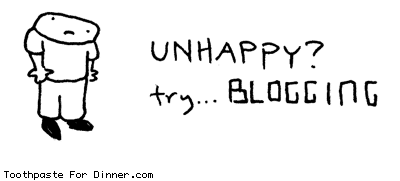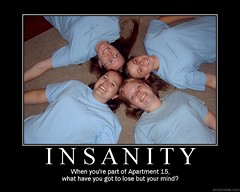On our most recent black Friday shopping spree, my dad purchased a DVD-R machine. The subsequent Saturday and Sunday were spent figuring out how to make the darn thing work. After actually breaking down and reading the manual, things went along quite swimmingly, and we started transferring all of our old, recorded-from-TV Christmas specials from VHS to DVD. We got through "A Charlie Brown Christmas," "Mickey's Christmas Carol," "Frosty the Snowman," and "Little Drummer Boy" before arriving at what must be my favorite Christmas special of all time: "Yes, Virginia, There is a Santa Claus." Sure, it's cheesy (and cheap) animation, but the story is absolutely thrilling. I still get chills when I hear the narrator read Francis Church's response to Virginia's letter:
VIRGINIA, your little friends are wrong. They have been affected by the skepticism of a skeptical age. They do not believe except [what] they see. [. . .]
Yes, VIRGINIA, there is a Santa Claus. He exists certainly as love and generosity and devotion exist, and you know that they abound and give to your life its highest beauty and joy. Alas! How dreary would be the world if there were no Santa Claus! It would be as dreary as if there were no VIRGINIAS. There would be no childlike faith then, no poetry, no romance to make tolerable this existence. We should have no enjoyment, except in sense and sight. The eternal light which childhood fills the world would be extinguished.
Not believe in Santa Claus! You might as well not believe in fairies! You might get your papa to hire men to watch in all the chimneys on Christmas Eve to catch Santa Claus, but even if they did not see Santa Claus coming down, what would that prove? Nobody sees Santa Claus, but that is no sign that there is no Santa Claus. [. . .]
No Santa Claus! Thank GOD! He lives, and he lives forever. A thousand years from now, nay, ten times ten thousand years from now, he will continue to make glad the heart of childhood.
After reading those words, you might well imagine the shock I felt reading Ben's post on the
Santa Myth. How could anyone believe encouraging belief in Santa Claus really be as dangerous as all that? Is Santa, in effect, the anti-Christ, in that he takes the place of the Savior in our holiday celebration?
Of course, you must have guessed my position on this issue by now, but humor me by allowing me to explicate further. No, I do not believe that encouraging children to believe in Santa Claus is wrong; on the contrary, my family is very strong about keeping up the Santa tradition. We hang signs that say, "This house believes," and threaten to take away presents from those who refuse to admit belief in Santa Claus. It's flat heresy to utter the words "Santa's not real" in our house.
In defence of this point of view, I would say these anti-Santa advocates have made one crucial mistake in their logic: they equate encouraging belief in the unreal with lying. I would argue that these are not the same at all, that while of course the second is wrong, the first is harmless, necessary, even healthy.
This willful suspension of disbelief is a wonderful and glorious part of our human experience. Besides Santa Claus, we see this technique commonly used with ghost stories and urban legends. A suspension of disbelief is necessary to maintaining these tales: who would enjoy listening to ghost stories without the narrator's insistance that they were real? The story cannot possibly have the same chilling effect if we know it is imaginary. Only when we are absolutely convinced that the story actually happened to someone's aunt's friend does it strike terror into our hearts.
The same way with Santa Claus: should we insist on asserting that Santa is completely fictional, the magical anticipation of Christmas morning would disappear. No child would anxiously look out the window, mistaking the blinking light of a satilite for the glow of Rudolph's nose, then dive into bed, furiously trying to sleep so she won't be caught awake when Santa comes. I look back on my true believing days with nostalgia and contentment. It is an experience that can be gained in no other way--to believe in something completely and utterly trivial. I maintain that it is a healthy and natural part of life, not to be disturbed because of rare and horrifying stories of children whose faith in Christ is damaged by Santa.
Of course, it is a pleasure that can be had only for a short while. When the dawn comes and the ghost-story teller reveals their craft, the magic is over. Once we first glimpse our Santa Claus presents in the storage closet, the opportunity for that magic in the world is gone. But simply because it cannot exist forever, should we shut down the experience entirely? No, no more than we would deny the beauty of a snowstorm or spring flowers because their presence was only temporary.
Additionally, this belief in Santa serves as a praticing ground for belief in Christ. If we can't believe in Santa Claus, who leaves us physical gifts every year, how can we find faith in Christ? It is essentially an exercise in what faith is--learning to believe without seeing. It's something that's difficult to gain experience in doing, and yet we must find a way to do it. Santa seems as good a method as any.
This aspect is, of course, what primarily concerns the anti-Santa league: isn't it wrong to have faith in something that doesn't exist? Aren't we setting kids up to believe that their faith in Christ will turn out the same way as their faith in Santa?
Obviously, I would argue no. We must develop faith in many things in this life which let us down--other people, for one. This practice faith is necessary. The world would be quite an awful place if we never trusted anyone. Of course we all recognize this faith should never supercede our faith in the one person who will never let us down, Christ. But when Christ told us not to trust in the arm of flesh, I much doubt that he meant we shouldn't trust other people. It's a warning of proportion, not absolutes.
As to the more general opposition of the materialistic and spiritual sides of Christmas, maybe I'm unique in that I've never had a problem with that. Even the materialistic gift-giving of Christmas was always redirected towards spiritual growth. For me, the search for the perfect gift--not just something that they want, but something that they need and that also says something about your special connection as family or friends--is as much an exercise in developing charity as any service project could be, perhaps more because it is undertaken not from necessity but from desire. When else will you spend hours in several different stores, thinking only of your friend and how much you love them?
And besides the gift-giving aspect, all of the other Christmas symbols, un-Christ-centered though they may be, serve to bind us together as a culture. We can laugh with almost anyone when we remember the terribly cheap animation of the Christmas specials or the tune of a familiar Christmas song. These things unify us across all other barriers--bridging social capital, if you will. And is not unity something Christ would have us develop? If we are not one, of course, we are not his.
That said, there's a very interesting Orson Scott Card Christmas short story called "
Homeless in Hell," which is about the Santa issue. The message is one we can all agree on: the Santa tradition is a healthy and righteous thing, so long as it does not supercede Christ.








